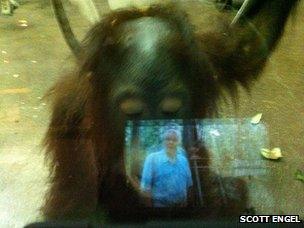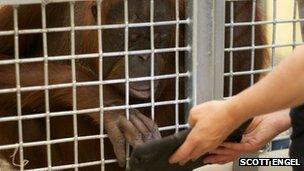Orangutans 'could video chat' between zoos via iPads
- Published
Orangutans at a Milwaukee zoo could soon be video-calling their primate friends via tablet computers.
The hairy tech fans have been playing with iPads since they were first introduced to them in May.
Conservationist Richard Zimmerman said the next step would be to provide wi-fi access - meaning the apes could watch orangutans in other zoos.
He hopes the experiment will raise awareness and funds to support the wild animals facing extinction.
Mr Zimmerman, from the US-based charityOrangutan Outreach, external, said he had wanted to give the device to the animals ever since it was launched back in January 2010.
"The original idea came literally when Steve Jobs gave his opening presentation introducing the iPad," he said.
"Independently, one of our supporters in Milwaukee was at the zoo showing the orangutan his iPad, and they were fascinated by it. We started to put things together."
Basic curiosity
They began introducing simple apps, such as drawing game Doodle Buddy, to orangutans atMilwaukee County Zoo, external.
Mr Zimmerman said the idea was to provide a "bit of fun" for the animals, who only get to use the devices for two short periods every week.
"What we really want to do is to allow the orangutans to really play - to do paintings, to watch videos, to do almost as a human child would do with basic curiosity."

The zoo keepers want to build reinforced tablets so they can let the orangutans play without human help
The animals have, Mr Zimmerman said, been captivated by watching television on the devices, particularly when it featured other orangutans, and even more so when they saw faces they recognised.
"They love moving images. They love bright things. They like to be entertained!
"They love new things, so one of the first things we're going to do to incorporate that is make sure the facilities have wi-fi capabilities so that the orangutans can actually have access to unlimited information - of course with the keepers guiding them."
Attenborough fan
He said the most exciting aspect of all was watching how the animals reacted to seeing themselves, and other apes on screen.
"Orangutans love looking at each other," said Mr Zimmerman, adding that one of the apes, 31-year-old MJ, is a fan of David Attenborough programmes.
"The orangutans loved seeing videos of themselves - so there is a little vanity going on - and they like seeing videos of the orangutans who are in the other end of the enclosure.
"So if we incorporate cameras, they can watch each other."
Other centres, zoos and sanctuaries are said to want to get involved "immediately" and are just waiting for more devices to become available.

Four-year-old orangutan Mahal watches a David Attenborough programme
"We've been limited to Milwaukee because we haven't been able to get enough iPads," Mr Zimmerman said.
"We've been waiting for the iPad 3 to come out to make the iPad 1 really obsolete, so we can pick up a few.
"We could just go out and buy them, obviously, but one of the things we've trying to really adhere to is making sure that our funds actually go out to the orangutans in need."
'15 seconds'
Mr Zimmerman said another problem he faced was protecting the machines, as he did not dare let the animals run off with them into their enclosures.
"As soon as we hand them over to the orangutans, we figure the lifespan could be as little as 15 seconds - whether they meticulously take them apart or just snap them in half."
Currently, zoo keepers have to hold the tablet computers while the animals reach through the enclosure bars and interact with simple gestures.
They are looking into building a reinforced iPad suitable for being thrown around, or perhaps fixing the device to a wall so it could in turn be hooked to a large projector viewable by zoo visitors.
In addition to this, Mr Zimmerman said there were developers keen to put together apps for the orangutans using design techniques similar to those adopted in software aimed at young children.
Although the animals are being extensively observed by zoo keepers, so far no formal behavioural research is taking place - something that is likely to change in the near future.

MJ paints a picture on the tablet - with the help of her keeper
"Research is going to come out of it, we know that, but as a charity geared towards conservation we're focusing on enrichment and making sure there's a conservation message attached," Mr Zimmerman said.
Orangutans are among the most at-risk species in the world.
Mr Zimmerman said extensive research into gorillas and touch-screens had been taking place at Zoo Atlanta for several years.
He stressed that none of the money that had been donated by the public to Orangutan Outreach has been spent on tablet computers - and that while it was a fun diversion for zoo visitors, the gadgets should not deflect from the serious threats facing the animals.
"It becomes a way of generating income for the charity. There's really no limit to what can be done," he said.
A spokeswoman for Milwaukee County Zoo told the BBC that the tablets were helping keep the animals in good shape.
"All of this is done as a form of enrichment, to exercise their minds, and keep them active and emotionally healthy," Jennifer Diliberti said.
"The work being done now with the iPads is simply a first step, and it's quite exciting."
- Published29 November 2011